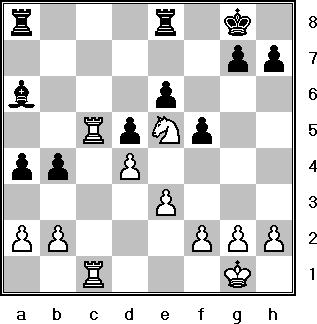|
Lesson
#3
First Attitude of a Chess Master
How does the chess master approach chess? I believe he applies three
all-important attitudes. They are like the water, sun and nutrients that, over
time, enable a tiny seedling to grow into a big tree. You may be surprised at
what these three attitudes are. They aren't about combinations or opening
theory. Rather, they enable you to mater and take charge of your play. This
times let's look at the first attitude.
Patience
How many times have your made a quick move only to
realize that is caused you to lose a piece? Most young chess players move too
quickly. A way to overcome this is to ask "Why did he do that?" after
your opponent moves. Patience is the first essential attitude of the strong
chess player.
|
|
 |
Black to move
|
I'd like to show you an endgame played by the great, and most patient,
Alexander Alekhine. Let's see how he gradually improved his position without
allowing any counterplay.
The White Rooks control the c-file and the Knight enjoys its outpost. Black
has advanced queenside pawns and dreams of playing Bc4 someday. Since the
White Rooks are so strong, Black would like to trade them, but 1. ... Rec8
would lose a pawn. Do you see how? After 2. Rxc8 Rxc8 3. Rxc8 B8x8 4. Nc6
threatens the b-pawn and the 5. Ne7+ fork. So instead, Black waits with 1.
... Reb8.
White has three nicely placed pieces. But there is one White piece that is
not in position yet/ Rather than rush into the seventh rank, Alekhine decided
to develop his one remaining piece: his King! 2. f3! b3. Black would
like to get counterplay on the queenside. How does White prevent it? That's
right, with 3. a3 he keeps the queenside closed and now the Black
Bishop is even worse off with more pawns on light squares.
Watch now Alekhine patiently improves his position. 3. ... h6 4. Kf2 Kh7
4/ h4 Rf8 6. Kg3 Rfb8 7. Rc7. Black, on the other hand, has mode no real
progress. Why? It is because Alekhine has maintained control of the board so
no counterplay is possible. For example, Black still cannot trade rooks
because after 7. ... Rc8 8 Rxc8 Rxc8 9 Rxc8 Bxc8 10. Nd3 followed by 11. Nc5
will win either the e-pawn or the a-pawn.
7. ... Bb5 8 R1c5 Ba6 9. R5c6 Re8 10. Kf4! The White monarch
continues his march toward the Black camp. He can journey without fear because
Black's pieces remain inactive.
10. ... Kg8 11. h5 With each small step forward to improve his
position, Alekhine shows patience. Many times in endgames, unlike openings,
haste makes waste.
11. ... Bf1 Black finally gets to attack something. Alekhine
patiently responds with 12. g3. Notice that he didn't play 12. g4 which
would allow Black to open the f-file for a Black Rook. Finding nothing better
to do, the Bishop returns home with 12. ... Ba6. It is very fulfilling
to play so well that your opponent has nothing useful to do.
Now that the Kind is ideally placed, we a re ready to start the next phase
— doubling rooks on the seventh rank. They are called the two pigs. Why?
Pigs eat a lot and when you get two Rooks on the seventh it is feeding time.
13. Rf7 Kh7 14. R6c7 Rg8. Now that the pigs are in position Alekhine
looks to improve the position of how Knight with a threat 15. Nd7 Kh8 16.
Nf6! Anyway! Of course, the Knight cannot be taken because the two pigs
would squeak out a mate on h7.
But Black thinks ho has a saving idea with 16. ... Rf8 and White
appears forces to trade a pig.
But Alekhine has seen deeply into the position. His patience to improve his
King position was rewarded with the beautiful 17. Rxg7! Rxf6 16. Ke5!
And the King had the final word. It either Black Rook goes to f8 then Alekhine
would play 19. Rh7+ Kg8 20. Rcg7 mate. Thus, Black resigned.
The strong chess player learns an attitude of patience is a must. Don't
just play the first move you see. Look deeper. Only then will you discover the
victories that await you.
Home Page ·
More Lessons
(c) 2001 Ross Stoutenborough
|